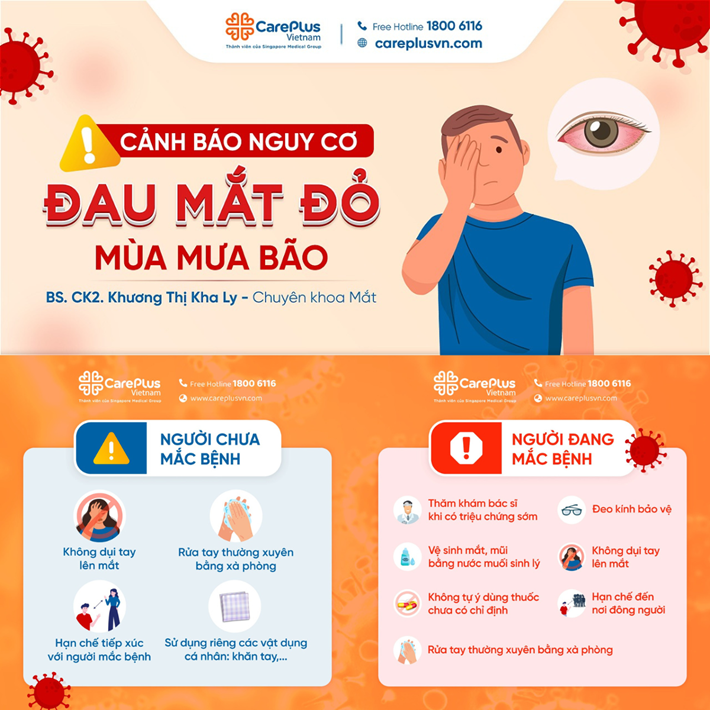WARNING: RISK OF PINK EYE DURING RAINY AND STORMY SEASON
Pink eye (conjunctivitis) is a common disease during the rainy season, especially in areas with limited access to clean water, spreading quickly with no specific treatment. The disease is caused by the Adenovirus, which spreads through respiratory droplets and can persist in the environment, easily spreading in communities with close contact.

9/20/2024 2:44:35 PM
This article is medically consulted by Dr. Khuong ThKha Ly, an Ophthalmologist at CarePlus International Clinic System.
Due to the impact of storms and tropical depressions, in recent days, prolonged heavy rains have led to an increase in air humidity, with temperatures ranging from 20 to 30°C, creating ideal conditions for microorganisms and viruses to thrive. Additionally, heavy rains and flooding can bring environmental pollutants, and stagnant water easily dissolves toxins, causing irritation, allergies, and increasing the risk of spreading eye diseases, especially pink eye.
IS PINK EYE DANGEROUS?
Pink eye (conjunctivitis) is a common disease during the rainy season, especially in areas with limited access to clean water, spreading quickly with no specific treatment. The disease is caused by the Adenovirus, which spreads through respiratory droplets and can persist in the environment, easily spreading in communities with close contact.
- The incubation period lasts 2-3 days after exposure, with early symptoms such as itching, irritation, red eyes, a gritty feeling in the eyes, discomfort, and sticky discharge around the eyelids upon waking. Initially, the inflammation may occur in one eye and then spread to the other within a few days.
- Some cases may experience subconjunctival hemorrhage, accompanied by sore throat, mild fever, runny nose, swelling of the preauricular lymph nodes, and general fatigue. If not treated in time, it can lead to corneal damage, keratitis, and long-term vision impairment.
- In children, pink eye tends to be more severe due to a weaker immune system and easily swollen tissues around the eyes. If parents notice symptoms such as swelling, redness, and heavy discharge in their child's eyes, they should take them for a check-up to prevent the condition from worsening.
HOW TO PREVENT THE DISEASE?
Although pink eye is highly contagious, it can be prevented by following the principles of “personal hygiene and environmental cleanliness”:
- Avoid touching or rubbing your eyes.
- Wash hands frequently with soap, especially after touching shared objects, as the disease spreads through tears and discharge containing the virus. People with pink eye often rub their eyes and then touch shared objects at home, school, or the workplace.
- Limit close contact with infected individuals.
- Use personal items like towels and glasses separately.
- Keep your home and surroundings clean.
🔹 For those already infected:
- Do not self-medicate with eye drops or oral medications without a doctor's prescription.
- Avoid unsafe folk remedies such as steaming with betel leaves, squeezing lemon, applying plant leaves, aloe vera, using bear bile, or breast milk, as these can worsen the infection.
- If you have respiratory symptoms, wear a mask to prevent the virus from spreading through respiratory droplets.
- Wash hands frequently with soap and after each eye drop.
- Limit going outside, especially to crowded places, while your eyes are still red and watery to avoid spreading the disease.
- Avoid rubbing your eyes, and regularly clean your eyes with saline solution.
- Wear protective glasses and clean them daily.
- Wash towels with soap and dry them in the sun, and do not share personal items with others.